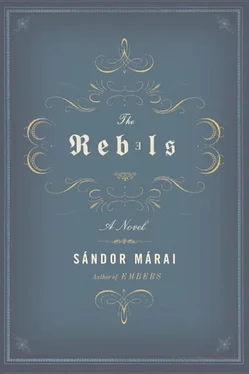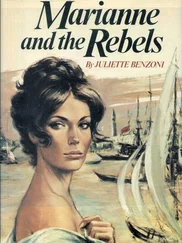He had to be in town by ten. The class photograph that was to join the others in the gallery, the gallery that included their fathers, was to be taken in the yard of the institution. He picked up his clothes. The building was deserted: the owner was hanging lanterns in the garden. Aimlessly he walked up and down the room among the accumulated hoard of things. It was all junk, boring, rubbish. He spun the globe and waited for it to stop. He carefully put his finger on Central Africa. Good heavens, he thought. What does it matter that the actor has kissed Tibor Prockauer?
He hadn’t gone home that night. When they parted in front of the theater he took a few steps homeward then turned and took the route leading to The Peculiar. He ran part of the way to get out of town as fast as he could, then slowed by the river. The night was warm and bright. He never considered going home. Perhaps I shall never go home again, he thought vaguely. There’s a change coming, something different from everything up till now, something other than Etelka or Papa or the teachers or Tibor or the actor, perhaps something much simpler and nicer, everything’s up for grabs, the whole thing needs careful, independent, rational thought. But that’s just a feeble consolation, he thought. The various buildings of The Peculiar glimmered white in the moonlight, picturesque, improbable. He crept quietly up to the room, the musty closeted smell mingling with the scent of rum, choking him. He opened the window, threw himself across the bed, and immediately fell asleep. The actor was coming towards him, his chest bare, his wig crooked. Tibor’s head fell back. Ábel was tugging at the actor’s arm. It’s cooled down! It’s a starry night! He was bellowing.
The dream faded. He slept deeply, his body still.
He put on his clothes and set off for town. He was hot in his black formal garments. A tuft of hair was sticking from his pocket. He drew out the wig, then, looking round to make sure no one could see, threw it away. The hairpiece lay on the road like a squashed furry animal. He raised it with his toe and gave it a disgusted kick. Whoever once grew this tuft of hair, he said to himself, is, from this moment, dead forever. He hurried past the repairman’s fence. He had lost his hat somewhere the previous night. The air was pure and clean, the sound of bells swam in it. May eighteenth. Friday. The photographer. He wanted to have a word with Tibor afterwards. Then it’s Havas at two. He might look in on his aunt. In the evening they would come out to The Peculiar. None of this was of particular interest really. He stopped, looked round, and for a moment considered going back to The Peculiar and waiting for them till evening. But then he thought he had to speak to Tibor. He lengthened his stride.
Over the fences peeped the branches of various fruit trees. The previous afternoon’s rain had beaten down the flowers. He passed the swimming pool, then stopped on the bridge to look at the yellow-colored river of his childhood, now in flood, the long grass bending over it into the water, his nose crinkling to the sharp sour smell.
Judge Kikinday, the man the mandarin had condemned to death, was just crossing the bridge.
Ábel leaned over the rails. If there was any justice Kikinday would have died long ago because it was three years now since the mandarin had sentenced him, in the belief that that would be the simplest course to take. Kikinday had himself sentenced several men to death, and hanged seven, overseeing the executions personally. The last was a Gypsy.
The mandarin was Ábel’s first friend, his own private discovery, the only mythical figure he had not found in old tales, but had personally invented. Maybe somebody once said something about what might happen if a mandarin in China were to press a button. Soon after Ábel rebelled against the town he found what remained of an old, dysfunctional bell, and whenever his enemies got him down he pressed the button and arranged their execution. Say he told a lie, for example, and his lie had been discovered: the accuser had to perish. In three short years he had been obliged to order four persons’ executions and in three cases the order had been carried out. Szikár was the first, the biology master who had hit him in fifth grade. The second was Canon Lingen, who had spied on them in the park. The third was Fiala, his classmate in sixth grade, who had betrayed a secret Ábel had entrusted to him. And the fourth was Kikinday, Colonel Prockauer’s friend, who had threatened to write a letter about their doings to his father when he came across them in a bar.
The mandarin was Ábel’s personal secret, someone he never spoke about, not even to the gang. The mandarin lived somewhere in China in a room with yellow wallpaper and had long sharp fingernails, a two-foot-long pigtail, and sat at a lacquered table with the mechanism on top of it. He had but to touch the button with one of those fingernails and someone somewhere in the world would perish. The mandarin was neither good nor evil: he administered justice disinterestedly. If someone in San Francisco looked askance at somebody, or spoke roughly, the mandarin would frown and examine the matter and, having done so, take action. His power extended over the whole planet. He touched the button with those refined long fingernails of his, a button that was no different in Ábel’s opinion from the button on a common doorbell, and someone in a distant corner of the world dropped dead, his head flopping over. Very few people knew this. People in general believed that Szikár, the biology master, drank himself to death, that Canon Lingen died of hardening of the arteries, and that Fiala’s early death was due to tuberculosis. Ábel, however, knew that all this was beside the point: the true cause of death was the mandarin. Ábel regarded himself as the mandarin’s local representative and that it was incumbent on him to act in a disinterested yet, of course, more conscientious spirit in such matters of judgment. The mandarin was Ábel’s most closely guarded secret. Everyone is happy to play the hangman in their imagination. Of the four sentences handed out by Ábel, judgments conducted in utmost secrecy under conditions of emergency in a form of martial law, three were approved by the mandarin and carried out with remarkable expedition. Kikinday, on the other hand, who had been sentenced some years ago, was clearly in a state of conspicuous health, and crossed the bridge now, panting a little but with the greatest possible dignity. Ábel knew the mandarin was simply delaying the execution. The game had long been imbued with a greater significance than he had earlier thought possible. He had recently sought out the instrument of execution, the dysfunctional hall doorbell that had been gathering dust in a drawer. After the resolution of the Fiala case Ábel felt tortured by uncertainty. The judgment, though not in itself unjust, might have been a touch severe, and maybe it would have been enough to commute it to lifelong hard labor, condemning Fiala to work out his time in a bank or the tax office. One can be wrong, thought Ábel. Now here was this Kikinday character…
“Nebulo nebulorum,” the condemned addresses him with the impeccable courtesy so often remarked in town. “And how do we like being an adult?”
Ábel looks up at Kikinday’s swollen face, the black teeth grimly glimmering under the Kaiser Wilhelm mustache, the whey-colored eyes swimming in the air above Ábel’s head. They cross the bridge together on their way to town. Kikinday asks after Ábel’s father and inquires in due patriarchal manner when Ábel and his friends hope to join up and move to the front. It was the way he questioned Lajos too before he went out. There is no malice in the question, for Kikinday stops every young man between seventeen and nineteen years of age and makes the same inquiry concerning their military plans.
Читать дальше












